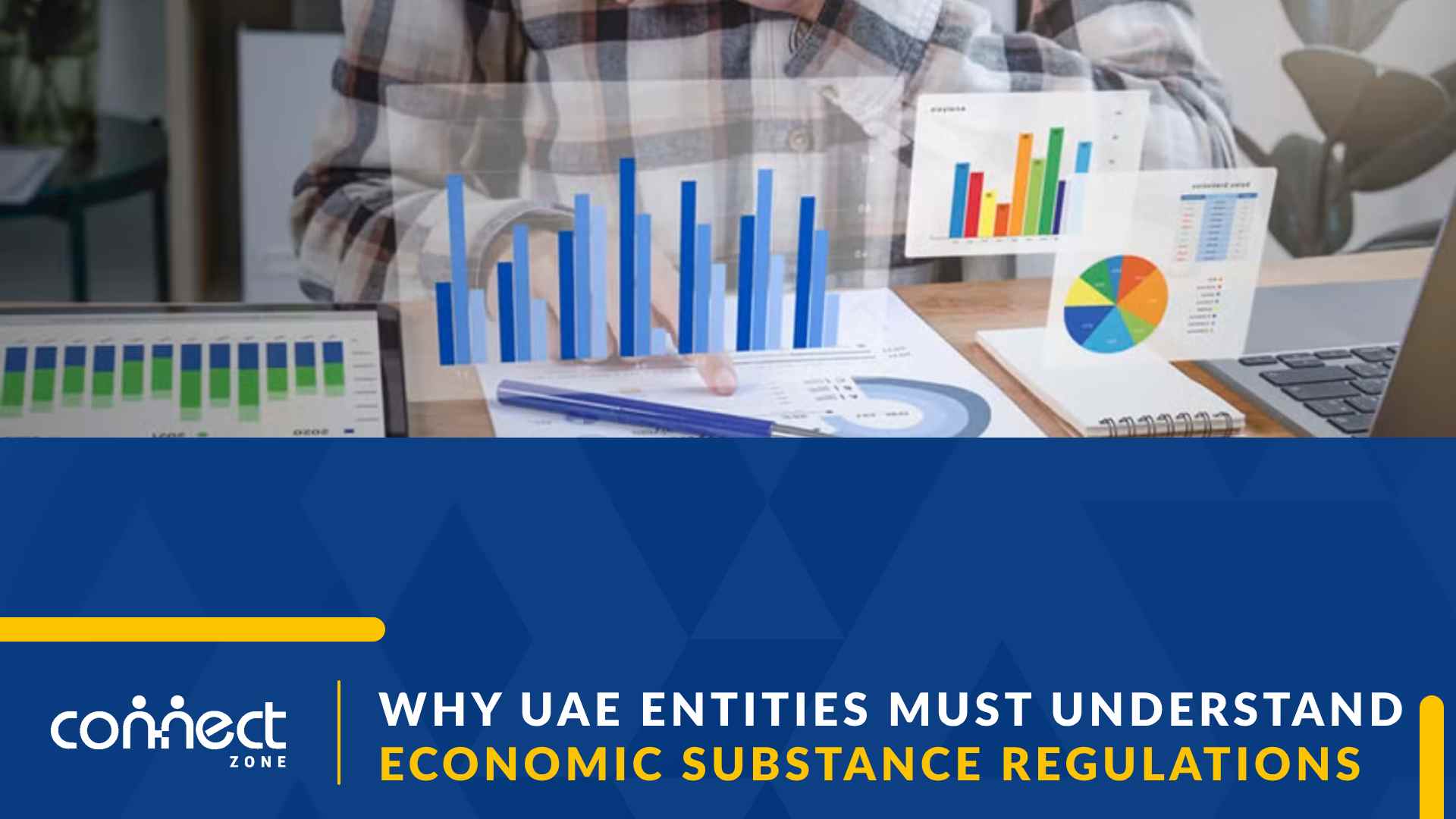Why UAE Entities Must Understand Economic Substance Regulations

Economic Substance Regulations (ESR) have become a pivotal aspect of the UAE’s business landscape, significantly impacting entities operating within its borders. These regulations, introduced to align with international standards, mandate stringent compliance measures for businesses. Understanding the nuances of Economic Substance Regulations is not just advisable; it is absolutely essential for the sustenance and growth of entities in the UAE.
In this article, we will explore the specific compliance requirements for various entity types, the profound influence of ESR on different business structures, effective strategies for implementation, and solutions to common challenges faced by UAE entities. Stay tuned to navigate the intricate world of Economic Substance Regulations successfully.
Specific Compliance for Different Entity Types
ESR affects various entity types, including companies, partnerships, and branches of foreign companies. Each entity type must adhere to specific compliance requirements to meet ESR standards. Understanding these distinctions is key to ensuring your entity’s compliance with the regulations.
Impact of Economic Substance Regulations on Different Entity Structures
Understanding the profound implications of ESR on various entity structures in the UAE is crucial for ensuring compliance and long-term business success. ESR is not a one-size-fits-all framework; it takes into account the unique characteristics of different business entities.
For companies, ESR mandates that core income-generating activities must take place within the UAE. This impacts businesses involved in banking, insurance, and shipping, as they must now have a substantial physical presence and personnel within the country. Compliance ensures they meet MOF ESR standards.
Partnerships also face significant changes. They must ensure their activities align with the requirements of the Ministry of Finance ESR. Also, detailed reporting is essential to show compliance with the specific criteria laid out in the regulations.
Additionally, branches of foreign companies operating in the UAE have their own set of challenges. These entities must provide accurate reports on their financial activities within the country to maintain their presence, ensuring compliance with ESR.
The impact of ESR is far-reaching, affecting the operational and financial aspects of each entity structure. So, essential to comprehend these consequences to guarantee compliance with the UAE Economic Substance Regulations and navigate the intricate regulatory landscape effectively.
By understanding how ESR influences different entity structures, businesses can position themselves for success in the UAE’s competitive market. This knowledge empowers them to make the necessary adjustments and investments to ensure compliance, avoid penalties, and maintain a strong presence in the UAE’s business environment.
Implementing Compliance Strategies
Now that we have explored the impact of ESR on different entity structures, let us delve into the strategies for ensuring compliance with these regulations. Overall, positioning your entity for success in meeting ESR standards is a proactive approach that can save your organization from potential penalties.
Positioning Your Entity for Success in Meeting Economic Substance Regulations
Positioning your entity for success in adhering to Economic Substance Regulations (ESR) is more than just a compliance exercise; it is a strategic move to thrive in the UAE’s competitive business environment. The Ministry of Finance ESR guidelines set the standard, and understanding what is ESR in UAE is the first step.
By assessing your entity’s activities thoroughly, you can identify areas that need improvement to meet the stringent requirements of ESR. This self-evaluation aligns your strategies with the overarching goals of the regulations.
Maintaining the Ministry of Finance ESR standards necessitates ensuring that your entity possesses the essential physical presence, qualified personnel, and operational expenses within the UAE. These elements are vital to economic substance, a cornerstone of ESR compliance.
Effective record-keeping is not only about meeting compliance but also about running your operations efficiently. So, automation tools and software solutions can help you keep precise records, reducing the likelihood of errors and streamlining reporting.
Staying up-to-date with regulatory changes is vital. The landscape may evolve, and being well-informed enables your entity to adapt quickly and efficiently. This proactive approach ensures that your strategies remain compliant.
Additionally, professional consultation with experts who understand economic substance regulations can be a game-changer. Their insights and guidance help fine-tune your strategies and align them with the evolving standards.
In summary, positioning your entity for success in meeting Economic Substance Regulations is a proactive and strategic approach. Also, it involves thorough assessments, adherence to Ministry of Finance ESR standards, efficient record-keeping, staying informed, and seeking expert guidance. By implementing these strategies, your entity not only complies with ESR but also strengthens its position in the UAE’s business landscape.
Common Challenges and Effective Solutions
While complying with ESR is essential, businesses in the UAE often encounter common challenges. Addressing these issues with effective solutions is vital to navigate the regulatory landscape successfully.
Addressing Common Challenges Faced by UAE Entities
UAE entities navigating the intricate landscape of economic substance regulations (ESR) often encounter several common challenges. Recognizing these issues and implementing effective solutions is key to ensuring compliance with ESR Ministry of Finance standards and thriving in the economic substance regulations UAE.
- Complex Regulatory Framework: The intricacies of ESR can be overwhelming. Seek professional guidance to grasp the requirements thoroughly. Expert insight simplifies the process.
- Resource Management: Meeting the requirements can strain resources. Strategic allocation of personnel and assets ensures efficient compliance without unnecessary costs.
- Documenting Activities: Comprehensive and accurate documentation is essential but time-consuming. Implement efficient record-keeping systems to streamline this process and reduce the administrative burden.
- Adapting to Changes: The regulatory landscape may evolve. Staying informed about amendments and adjusting your strategies accordingly is critical for ongoing compliance.
- Risk of Non-compliance: Non-compliance can result in penalties and harm your entity’s reputation. Prioritize compliance efforts and seek professional assistance when necessary.
Incorporating these solutions into your economic substance regulations UAE compliance strategy empowers your entity to address these challenges proactively. By leveraging expert guidance, resource optimization, efficient documentation, and adaptability to regulatory changes, your entity not only complies with ESR Ministry of Finance standards but also secures its long-term success in the UAE’s business environment. Stay ahead of the curve, navigate challenges effectively, and position your entity for enduring success in the world of economic substance regulations.
Additional Strategies for ESR Compliance
In addition to the challenges and solutions discussed, here are two more strategies to enhance your entity’s compliance with ESR:
Leveraging Technology
In the realm of economic substance regulations, leveraging technology is not just an option but a necessity for efficient compliance. Embracing advanced software solutions can significantly ease the burden of adhering to UAE economic substance regulations.
Automation plays a pivotal role. Implementing automated systems for record-keeping and reporting ensures accuracy and timeliness. Such tools reduce the likelihood of human error, guaranteeing precise compliance with economic substance regulations.
Data management platforms enable seamless organization of financial information. These platforms streamline the process of extracting relevant data, allowing entities to generate reports efficiently. In a world governed by stringent regulations, swift access to accurate information is invaluable.
Moreover, artificial intelligence (AI) technologies are reshaping compliance processes. AI-driven algorithms can analyze vast datasets swiftly, identifying patterns and discrepancies. This advanced analysis helps entities align their activities with economic substance regulations effectively.
Blockchain technology is another game-changer. Its decentralized nature ensures the security and integrity of financial records. Utilizing blockchain for transactions and data storage enhances transparency, a core requirement of UAE economic substance regulations.
Additionally, cloud-based solutions facilitate real-time collaboration and access to documents. Therefore, this accessibility is paramount, especially for entities with multiple stakeholders or international branches. Cloud technology ensures that all authorized personnel have instant access to the necessary information, promoting streamlined compliance efforts.
By embracing these technological advancements, entities can not only ensure compliance with economic substance regulations but also enhance operational efficiency. Technology transforms compliance from a daunting task into a streamlined, secure, and accurate process, empowering businesses to thrive in the ever-evolving landscape of regulatory standards. Stay technologically adept, stay compliant, and position your entity for success in the realm of economic substance regulations.
Professional Consultation
Seeking professional consultation regarding economic substance regulations is an invaluable step for businesses striving for seamless compliance. Experts possess in-depth knowledge, providing tailored guidance essential for navigating the intricate regulatory landscape.
Specialized advisors offer clarity, demystifying complex compliance requirements. Their expertise ensures a comprehensive understanding of economic substance regulations, allowing businesses to align strategies effectively.
Additionally, consultants provide nuanced insights, aiding in the development of personalized compliance strategies. By leveraging their experience, businesses can proactively address potential pitfalls and optimize their processes to meet regulatory standards.
These professionals not only interpret the regulatory jargon but also offer practical solutions. Indeed, their guidance extends beyond mere compliance, focusing on optimizing operations while adhering to economic substance regulations.
Furthermore, consultants keep abreast of regulatory updates, ensuring businesses remain current and adaptable. Their vigilance guarantees that compliance strategies evolve alongside the regulations, reducing the risk of non-compliance.
Collaborating with knowledgeable advisors fosters confidence within businesses. It allows them to concentrate on their core activities, knowing that compliance efforts are in capable hands. This proactive approach mitigates risks, enhances efficiency, and fortifies the entity’s standing in the face of evolving ESR.
In conclusion, professional consultation is an indispensable investment for businesses. It provides the expertise necessary to navigate the complexities of ESR; ensuring businesses not only meet compliance standards but also thrive in a regulated environment. Stay informed, seek guidance, and position your business for success in the realm of economic substance regulations.
Global Perspectives on Economic Substance Regulations
Economic substance regulations have not only become integral to the UAE’s business landscape but have also gained prominence on a global scale. These regulations, although unique in their details, share common objectives with similar regulations in other countries.
While the UAE’s approach to economic substance regulations reflects its commitment to international standards, it is beneficial to consider how these regulations align with those in other jurisdictions. Many countries have implemented their own economic substance requirements, often stemming from international agreements and recommendations. So, these regulations aim to combat tax evasion, profit shifting, and base erosion by ensuring that business activities conducted within a country genuinely contribute to its economic well-being.
For UAE entities operating globally, understanding how their compliance with the UAE’s economic substance regulations aligns with international standards is crucial. It enables businesses to navigate the complexities of cross-border operations effectively while adhering to the specific requirements of the UAE.
The implications of these global perspectives are significant. They influence decision-making processes, taxation, and the structuring of operations. Businesses need to stay informed about international economic substance regulations to operate smoothly in a complex global environment. Additionally, demonstrating alignment with international standards can enhance the reputation and competitiveness of UAE entities on a global scale.
In conclusion, economic substance regulations in the UAE are part of a larger global movement towards fair and transparent economic practices. Understanding their alignment with regulations in other countries is essential for UAE entities that engage in international business. It helps them operate efficiently, maintain compliance, and enhance their standing in the global business landscape.
Conclusion
In conclusion, understanding and complying with economic substance regulations is paramount for entities operating in the UAE. Overall, these regulations, set by the Ministry of Finance ESR, are not merely administrative hurdles but strategic imperatives for success.
By recognizing the specific compliance criteria for different entity structures and the profound impact of economic substance regulations, businesses can proactively position themselves for success.
Implementing compliance strategies, including accurate record-keeping and adapting to regulatory changes, empowers entities to meet the standards set by UAE economic substance regulations.
Overcoming common challenges, such as resource management and risk of non-compliance, demands strategic solutions to ensure long-term viability.
Leveraging technology, from automation to AI, streamlines compliance efforts, making the process more efficient and precise. Professional consultation provides invaluable expertise in navigating the intricate regulatory landscape.
In this evolving business environment, compliance is not merely a box to tick; it is a competitive advantage. Businesses that embrace economic substance regulations and proactively adapt to them secure their place in the UAE’s dynamic market. Stay informed, stay compliant, and position your entity for success in the realm of economic substance regulations.
For further inquiries, call +971 4331 6688 or email us at [email protected]. Our representatives are here to assist you, ensuring your compliance journey is smooth and successful. Stay proactive and compliant in the evolving business landscape.


